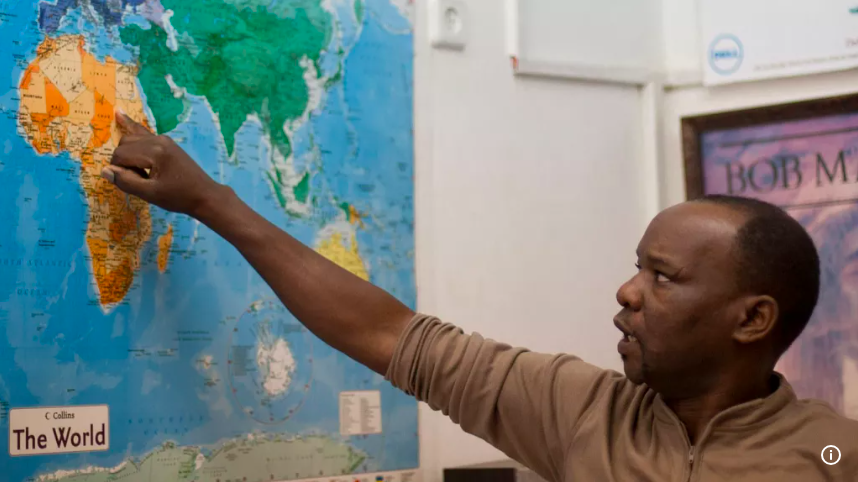Africa Day 2025: Celebrating May 25 the Continent’s Journey of Unity, Progress, and Cultural Pride
Quote from Alex bobby on May 26, 2025, 5:31 AM
Africa Day: Celebrating Unity, Progress, and Cultural Brilliance
Every year on 25 May, the world pauses to celebrate Africa Day, a moment that transcends borders to honour the rich cultural tapestry, immense natural wealth, and resilient spirit of the African continent. It is a date that carries both historical weight and modern-day significance — a celebration of Africa’s journey from colonial subjugation to political freedom, and its continued strides toward prosperity, unity, and global relevance.
A Historic Path to Unity
The story of Africa Day is deeply intertwined with the liberation movements of the 20th century. It all began in 1958, when the first Congress of African States convened. At that landmark gathering, leaders from newly independent nations and territories still under colonial rule met with a shared objective: to dismantle the structures of colonialism and reclaim autonomy over their lands and peoples.
From that meeting, the concept of "African Freedom Day" was born, symbolising the collective determination to achieve independence and promote solidarity among African nations. These annual gatherings laid the foundation for a broader continental alliance, culminating in the formation of the Organisation of African Unity (OAU) on 25 May 1963 — a date officially commemorated as Africa Day.
Today, the OAU's successor, the African Union (AU), continues to champion integration, peace, and sustainable development across the continent.
Africa’s Transformation in the 21st Century
Africa Day is more than a commemoration of history — it is also a time to reflect on the incredible economic, social, and political transformations that Africa has undergone, particularly in recent decades.
Countries like Rwanda, Ghana, Ethiopia, and Côte d’Ivoire have posted impressive growth rates, often outperforming global economic trends. These success stories underline the untapped potential of African markets and the resilience of their people in the face of past and present challenges.
A particularly inspiring aspect of Africa’s growth is the increased participation of women in the economy and governance. African women are not just contributors; they are leaders, trailblazing in fields from entrepreneurship to politics. Rwanda’s parliament, for example, boasts the highest percentage of female lawmakers in the world, showcasing Africa's leadership in gender equality.
Prominent figures like Ellen Johnson Sirleaf, Africa’s first elected female head of state, and Ngozi Okonjo-Iweala, Director-General of the World Trade Organisation, have become global icons of African excellence and empowerment.
The Power of Decolonisation
Africa’s journey to self-determination was long and arduous. The decolonisation process, largely backed by the United Nations, succeeded in bringing independence to every African nation by the late 20th century. This shift wasn’t just political — it opened the doors for African societies to reclaim their identities, celebrate their indigenous cultures, and control their own resources and policies.
The progress has not been without setbacks, but the continued push for education, innovation, and unity has propelled Africa forward.
Cinema: A Mirror of African Realities
Film has been an essential medium for portraying Africa’s stories to a global audience. While often produced outside the continent, many cinematic works have brought African narratives, landscapes, and struggles into international consciousness.
- "Out of Africa" (1985) captured the stunning beauty of Kenya and introduced global audiences to the emotional complexities of colonial life.
- "Blood Diamond" (2006) brought to light the harsh realities of civil conflict and the ethical dilemma of resource exploitation in Sierra Leone.
- "Invictus" (2009) highlighted the transformative power of sport in post-apartheid South Africa, with Nelson Mandela using rugby as a unifying force.
Other impactful films include "Hotel Rwanda" (2004), "The Last King of Scotland" (2006), and "Beasts of No Nation" (2015) — all of which cast light on significant historical events, often underrepresented in mainstream media. Most recently, "Black Panther" (2018) broke new ground by celebrating an Afro-futurist vision of Africa that was powerful, innovative, and self-sufficient — a vision that resonated across continents and cultures.
Celebrating in the Digital Age
Today’s Africa Day celebrations blend tradition and technology. From art exhibitions, music festivals, and food fairs to academic forums and policy discussions, African countries mark the day with vibrant and inclusive events.
Social media platforms like Twitter, Instagram, and TikTok have transformed the way Africa Day is commemorated. Hashtags such as #AfricaDay and #ProudlyAfrican connect millions of users in celebrating African identity, sharing cultural pride, and challenging outdated stereotypes.
This digital celebration fosters a more inclusive, authentic, and multifaceted portrayal of Africa, amplifying voices that have long been underrepresented in global dialogues.
Looking Forward
Africa Day is not just a celebration of what has been achieved — it is a call to action for what lies ahead. It invites Africans and global allies alike to support pan-African unity, promote economic equity, and invest in sustainable development.
From the resilience of its people to the vibrancy of its cultures and the brilliance of its innovators, Africa is a continent of promise — one that continues to shape the global future with its stories, struggles, and triumphs.
As the world marks another Africa Day, it does so in honour of a continent that continues to inspire, transform, and lead with dignity and purpose.
Conclusion
Africa Day is far more than a symbolic anniversary — it is a powerful reminder of a continent’s journey from colonisation to independence, from adversity to achievement. It celebrates not only Africa’s rich cultural heritage and natural beauty but also the strength, resilience, and innovation of its people. As African nations continue to rise in global influence, lead in gender equality, and shape narratives through art, politics, and technology, Africa Day invites the world to recognise and support this dynamic progress. In commemorating 25 May, we honour the past, celebrate the present, and look forward with hope to a future shaped by African leadership, unity, and vision.

Africa Day: Celebrating Unity, Progress, and Cultural Brilliance
Every year on 25 May, the world pauses to celebrate Africa Day, a moment that transcends borders to honour the rich cultural tapestry, immense natural wealth, and resilient spirit of the African continent. It is a date that carries both historical weight and modern-day significance — a celebration of Africa’s journey from colonial subjugation to political freedom, and its continued strides toward prosperity, unity, and global relevance.
A Historic Path to Unity
Register for Tekedia Mini-MBA edition 17 (June 9 – Sept 6, 2025) today for early bird discounts. Do annual for access to Blucera.com.
Tekedia AI in Business Masterclass opens registrations.
Join Tekedia Capital Syndicate and co-invest in great global startups.
Register to become a better CEO or Director with Tekedia CEO & Director Program.
The story of Africa Day is deeply intertwined with the liberation movements of the 20th century. It all began in 1958, when the first Congress of African States convened. At that landmark gathering, leaders from newly independent nations and territories still under colonial rule met with a shared objective: to dismantle the structures of colonialism and reclaim autonomy over their lands and peoples.
From that meeting, the concept of "African Freedom Day" was born, symbolising the collective determination to achieve independence and promote solidarity among African nations. These annual gatherings laid the foundation for a broader continental alliance, culminating in the formation of the Organisation of African Unity (OAU) on 25 May 1963 — a date officially commemorated as Africa Day.
Today, the OAU's successor, the African Union (AU), continues to champion integration, peace, and sustainable development across the continent.
Africa’s Transformation in the 21st Century
Africa Day is more than a commemoration of history — it is also a time to reflect on the incredible economic, social, and political transformations that Africa has undergone, particularly in recent decades.
Countries like Rwanda, Ghana, Ethiopia, and Côte d’Ivoire have posted impressive growth rates, often outperforming global economic trends. These success stories underline the untapped potential of African markets and the resilience of their people in the face of past and present challenges.
A particularly inspiring aspect of Africa’s growth is the increased participation of women in the economy and governance. African women are not just contributors; they are leaders, trailblazing in fields from entrepreneurship to politics. Rwanda’s parliament, for example, boasts the highest percentage of female lawmakers in the world, showcasing Africa's leadership in gender equality.

Prominent figures like Ellen Johnson Sirleaf, Africa’s first elected female head of state, and Ngozi Okonjo-Iweala, Director-General of the World Trade Organisation, have become global icons of African excellence and empowerment.
The Power of Decolonisation
Africa’s journey to self-determination was long and arduous. The decolonisation process, largely backed by the United Nations, succeeded in bringing independence to every African nation by the late 20th century. This shift wasn’t just political — it opened the doors for African societies to reclaim their identities, celebrate their indigenous cultures, and control their own resources and policies.
The progress has not been without setbacks, but the continued push for education, innovation, and unity has propelled Africa forward.
Cinema: A Mirror of African Realities
Film has been an essential medium for portraying Africa’s stories to a global audience. While often produced outside the continent, many cinematic works have brought African narratives, landscapes, and struggles into international consciousness.
- "Out of Africa" (1985) captured the stunning beauty of Kenya and introduced global audiences to the emotional complexities of colonial life.
- "Blood Diamond" (2006) brought to light the harsh realities of civil conflict and the ethical dilemma of resource exploitation in Sierra Leone.
- "Invictus" (2009) highlighted the transformative power of sport in post-apartheid South Africa, with Nelson Mandela using rugby as a unifying force.
Other impactful films include "Hotel Rwanda" (2004), "The Last King of Scotland" (2006), and "Beasts of No Nation" (2015) — all of which cast light on significant historical events, often underrepresented in mainstream media. Most recently, "Black Panther" (2018) broke new ground by celebrating an Afro-futurist vision of Africa that was powerful, innovative, and self-sufficient — a vision that resonated across continents and cultures.
Celebrating in the Digital Age
Today’s Africa Day celebrations blend tradition and technology. From art exhibitions, music festivals, and food fairs to academic forums and policy discussions, African countries mark the day with vibrant and inclusive events.
Social media platforms like Twitter, Instagram, and TikTok have transformed the way Africa Day is commemorated. Hashtags such as #AfricaDay and #ProudlyAfrican connect millions of users in celebrating African identity, sharing cultural pride, and challenging outdated stereotypes.
This digital celebration fosters a more inclusive, authentic, and multifaceted portrayal of Africa, amplifying voices that have long been underrepresented in global dialogues.
Looking Forward
Africa Day is not just a celebration of what has been achieved — it is a call to action for what lies ahead. It invites Africans and global allies alike to support pan-African unity, promote economic equity, and invest in sustainable development.
From the resilience of its people to the vibrancy of its cultures and the brilliance of its innovators, Africa is a continent of promise — one that continues to shape the global future with its stories, struggles, and triumphs.
As the world marks another Africa Day, it does so in honour of a continent that continues to inspire, transform, and lead with dignity and purpose.
Conclusion
Africa Day is far more than a symbolic anniversary — it is a powerful reminder of a continent’s journey from colonisation to independence, from adversity to achievement. It celebrates not only Africa’s rich cultural heritage and natural beauty but also the strength, resilience, and innovation of its people. As African nations continue to rise in global influence, lead in gender equality, and shape narratives through art, politics, and technology, Africa Day invites the world to recognise and support this dynamic progress. In commemorating 25 May, we honour the past, celebrate the present, and look forward with hope to a future shaped by African leadership, unity, and vision.
Uploaded files:


